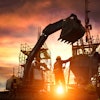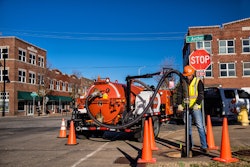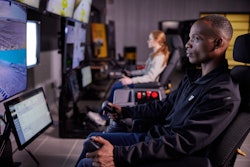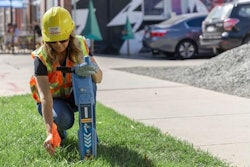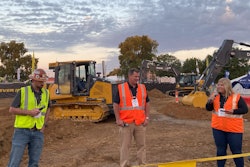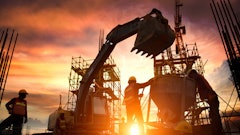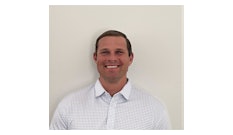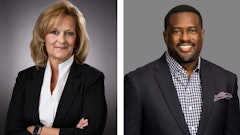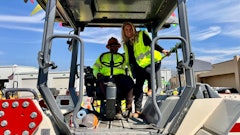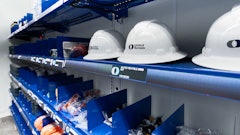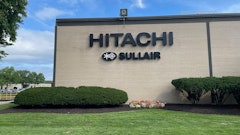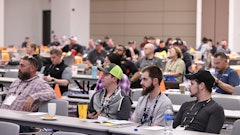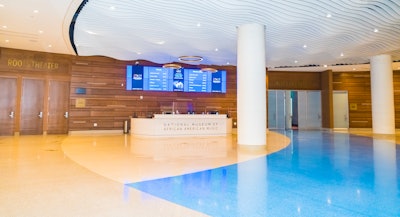
Brandon Mason is the founder and president of BCMason Group — a certified minority company providing infrastructure, development and general contracting services with a dedication to community impact projects in Nashville, Tennessee. We sat down with Mason to learn more about Mason's career and ties to the construction industry and discuss: his family connection to and passion for the construction industry; the work his company did on the National Museum of African American Music in Nashville; and why representation matters in the industry. Read on for his insights.
Tell us about your company, BCMason Group. How did you choose the construction industry?
Mason: Growing up, I've always been around construction with my family. My grandfather and my dad were in residential construction. It was a natural fit for me. I had the opportunity to go to Western Kentucky and get a construction management degree and then traveled around for some larger general contractors around the country. Then I settled in Nashville.
Around 2016, I had the opportunity to work for a local general contractor and not travel anymore. I created BCMason Group in 2019 with the desire to become a midsize infrastructure and site work company.
We have diverted to an infrastructure-based company, but we still do some general contracting and community impact projects around the Nashville, Tennessee, area. We [have] really homed in on a niche with smaller … work. We're very nimble. We're very flexible. We [can] tackle a wide range of projects within the infrastructure and community impact project space.
Tell us about your work with the National Museum of African American Music.
Mason: [My team worked on] the National Museum of African American Music and projects across the four historically Black colleges and universities (HBCUs) in Nashville.
What were some challenges you might have faced? Did you have any major wins or aha moments?
Mason: Every project has its own story and challenges. What I like is: What else? What I say to the team is that you work  Brandon Mason, founder and president of BCMason Group.BCMason Group
Brandon Mason, founder and president of BCMason Group.BCMason Group
The national museum of National Museum of African American Music was really the kickstart [for] our firm. The team was made up of African Americans from ownership down to general contractor. It was really an opportunity for mentorship. Those individuals really mentored me and some other guys … that were coming up in the industry to really show how to operate and prove and show that we could pull that project together. It was very inspiring.
The leaders of that project really pushed us to be entrepreneurs and allowed us to handle the challenges in the projects to allow us to grow. From there BCMason Group has had the opportunity work at the Meharry Medical College doing a sidewalk improvement project.
We worked at Fisk University doing a sidewalk improvement project. That one was special because my mom … went to college at Fisk. So, it was It's pretty great to tie that together. She passed away when I was eight, so to be able to work on a sidewalk that she potentially walked across [was great]. It was a paver sidewalk that has been there for 100 years, so we had the opportunity to preserve it and extend it.
American Baptist College is another HBCU that we've worked on here in Nashville, expanding their library and doing some … renovations to their apartments.
Finally, [at] Tennessee State University, we did a sidewalk project that connected a bus stop to the front door of Kean Hall. Turns out [it] was pretty important to people. [Before the sidewalk], they had walked through grass and dirt for many years. It was a small project that we knocked out in a day, but it was very impactful to the students and the faculty.
From starting at the National Museum of African American Music and then working on those four HBCUs has really propelled and exposed BCMason group to be able to show what our capabilities are. We have the opportunity now to [work on] the Christian & Gospel Music Museum this fall near the National Museum of African American Music downtown. That was a referral from our work at the National Museum of African American Music.
WeGo Public Transit has also become a … strong client of ours [because] we focus on infrastructure and transit in doing sidewalk and mobility improvement projects around Nashville. I can't speak enough about the influence of the team from the Museum of African American Music and how that [project] has really propelled our stability and our success here in Nashville.
How can your story help other minorities consider construction & a career as a construction company owner?
Mason: I hope [it can]. Business in general is tough. Access to capital is one of the major challenges in any business. The construction industry is a high-risk business … I'm hopeful that we can provide opportunities to not just minorities but people who are interested in the industry … the National Museum of African American music talked for years [that] they didn't know where their next project was coming from, like the backlog was something that they didn't know … It's so tough in the construction Industry.
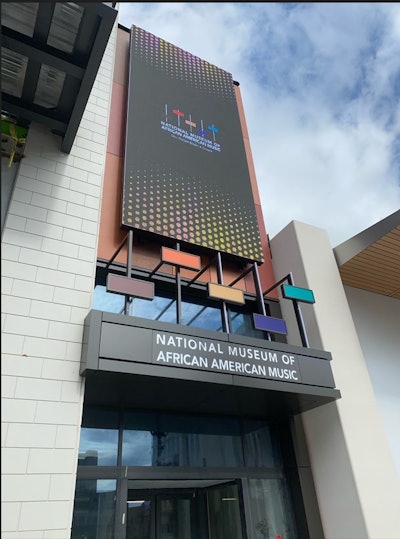 The National Museum of African American Music, which Mason credits with kickstarting his firm.National Museum of African American Music
The National Museum of African American Music, which Mason credits with kickstarting his firm.National Museum of African American Music
I think we pride ourselves on doing good work. We struggled early on getting projects because we were young and didn't have a lot of experience … We had opportunity with WeGo [Public Transit]. It was our first sidewalk project. It was about a $10,000 project. It seemed minor at the time, and it seemed small, but it was at a church. There was a lady named Miss Bernice who uses that bus stop to get to church during the week and on Sundays. She had been doing that upwards of 20 years, and it didn't have a shelter. It didn't have any sidewalk. And you know when we had the grand opening of that of that sidewalk, the pastor told a story about how Miss Bernice uses that bus stop to get back and forth to church functions, and that really kicked off community impact projects for us and what [they mean] for the community and for minorities in North Nashville and surrounding Nashville.
So, I'm hopeful that we are encouraging others to get into the construction industry, including minorities. We try to do anything we can to support and help and the same way that my mentors encouraged me and supported me ... I'm hopeful, I think.
If I could share any advice [with] anybody thinking about it: Patience is key. You're not going to be a $2,000,000 company Day 1. It takes years to grow your brand and to really get quality people. But you’ve got to be confident in the sense that you just keep knocking on doors and being confident in your capabilities but also be willing to learn as things grow and you have opportunities.
What are some equipment or technologies that have helped you & your team during your journey?
Mason: We started with the Bobcat E50 excavator, a dump trailer and a pickup truck. We still have that E50 today. Three years ago, when we bought that E50, it seemed like a massive machine. We still have that machine, and we still use it. The project [that] we're working on this morning, we have six machines going. We've got skid steers and wheeled excavators that we're using to do work.
It's pretty great to have partners that we can rent [from] and utilize. Our projects [range is] vast with regards to infrastructure, where we may do 100 feet of sidewalk one day or we may do a sewer line. That's a thousand feet of sewer line, 10 feet or 12 feet in the ground. [Then] we may go do a parking lot where we [must] do some grading. Being able to have rental partners to get the equipment that we need … is important.
I would be broad on the equipment spectrum to say you know having a good rental partner to … provide the equipment that you need, specifically the heavy machinery, has been great.
[As for the tools that we] utilize, Raken has been a very impactful tool for us with regards to daily reports, observations and just tracking materials and safety on projects. Documentation is critical and important to the success of not only, that story of the project, but it's great to have that documentation, too. [If] issues arise, you can go back and have a daily report with a photo.
We can put it in our in our phone or iPad, and it spits it out like we're a billion-dollar company. The way that report looks … like we're sophisticated [like] we know what we're doing. Not to say that we don’t, but it makes it real easy and simple for the guys in the field.
Monday.com is another technology we utilize for project management and coordination of our team, and it's been a very resourceful tool for us as a small business. We're a team of 10 and, it's important that we're all communicating in some way … so everybody understands who's handling what and how things are getting done from an equipment standpoint.
I would say having a great rental partner has been great for us to provide the equipment that we need. We own our own skid steers and a couple excavators, but we're not to the point where we own everything. Every job just requires something different and technology. Monday and Ranken are the tools that we use daily.
I am intrigued with artificial intelligence (AI) and the impact that it's going to have in construction. I haven't wrapped my head around what those opportunities are yet. We're a younger company and our employees are younger. So, the cool and the great technologies are something that are important to our team. We try to use technology and utilize it as best we can because that's what the next generation is used to. That's what they're [used to with their] phones and iPads. Then this AI thing … we're looking at potentially having battery operated machines.
There's machines that operate with the remote. We've used the RodRadar Bucket that locates utilities as you're digging, and it was … successful on a sewer project that we had. We're definitely looking to be using the technology to essentially make us more efficient in how we do things on the jobsite.
What else would you like to share with our listeners about your journey?
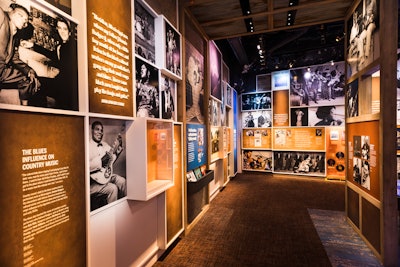 Interior view of the museum.National Museum of African American Music
Interior view of the museum.National Museum of African American Music
We try to get as much advice [as possible], especially on our new project that [has] a component that we hadn't done before. Try to ask for help. People will and are willing … to help or lead you in the right direction. Just don't be ashamed to ask. Every project that anybody does is a project that they've never done before. I we're considered as experts when we're hired to do the job, but that job has never been done before. Be willing to learn. Try to take different approaches that will fit that project. [In my] superintendent days, I'd love when a when a sub would come up and say, “I've been doing this for 20 years,” and I'm like, well great, but this is Year 1 of this way. [Being] open to approaching things a different way [is important].
Then patience [is] probably one of my biggest lessons. It's not necessarily patience with projects. It's more patience with people and patience with the company's growth. I call myself a conservative leader in that we evaluate risk on projects and things pretty tight, just because we're a smaller company. We don't look to hit homeruns on every job. We like the singles. We like the doubles, and then if [we] just so happen to get a triple or a homerun on a job, [that’s] great. We want to really be conservative in how we protect our risk, and it allows our people to grow and develop at a pace that's good for them as well. People aren't lining up at the door knocking to come work for BCMason Group, right? It's just simply because the labor is scarce throughout right now. So, the people that we do have we [want to keep].
We [must] understand that the growth and development of our people matter, as well. So, if we outpace their development, it strains the company, and it strains our ability to serve and provide a quality product for our client. Patience and developing and growing [the people] around you and really wanting to have them be fulfilled… is critical to any company’s success.
For more, listen to the podcast now.

